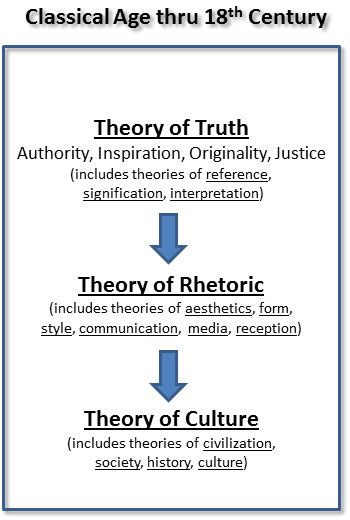Preliminary Class Business
- Enrollment
- Course syllabus online:
(or navigate to it from English Dept. web site)
-
Questions about course?
- Readings and assignment for next time
1. Background to Literary Theory (via "Defenses" of Literature)
Classical Greece & Rome
Philosophy
Trivium: Grammar, Rhetoric, Dialectic
Quadrivium: Arithmetic, Music, Geometry, Astronomy
Middle Ages & Renaissance
Theology
Trivium: Grammar, Rhetoric, Dialectic
Quadrivium: Arithmetic, Music, Geometry, Astronomy
Enlightenment (17th-18th centuries)
Reason (& "Natural Philosophy")
Trivium: Grammar, Rhetoric, Dialectic + Philology
Quadrivium: Arithmetic, Music, Geometry, Astronomy +
chemistry, biology, geology, calculus, etc.
Modernity (late 19th-20th centuries)
Theory
Trivium: Grammar, Rhetoric, Dialectic ![]() Media
Media
Quadrivium: Arithmetic, Music, Geometry, Astronomy ![]()
"The Human Sciences"
(math & science, social sciences, humanities, arts)
- DEFENSES OF LITERATURE: SOME RELEVANT WORKS
- Margaret W. Ferguson, Trials of Desire: Renaissance Defenses of Poetry (New Haven, 1983) [See Ferguson's bibliography for a resumé of defenses of literature.]
- Joachim Du Bellay, La Deffence et illustration de la langue francoyse (1549)
- Torquato Tasso, Apologia in difesa della "Gerusalemme Liberata" (1585)
- Jacopo Mazzoni, On-the Defense of the "Comedy" of Dante (1587)
- Sir Philip Sidney, The Defense of Poesy (written c. 1579; pub. 1595)
- William Wordsworth, "Preface" to Lyrical Ballads (1800)
- Percy Shelley, A Defense of Poetry (1821)
- Boris Eichenbaum, "The Theory of the 'Formal Method'" (1926)
- M. H. Abrams , "Belief and the Suspension of Disbelief" (1958)
- J. L. Austin, "A Plea for Excuses" (1956-57)
- W. K. Wimsatt, Day of the Leopards: Essays in Defense of Poems (1976)
- Paul de Man, The Resistance to Theory (1986)
- Also: legal defenses of literature -- e.g.,
- Sedition and Treason trials of the 1790's in England
- United States v. One Book Called Ulysses (1933)
- English Obscene Publications Act trial of Penguin Books for D. H. Lawrence's Lady Chatterley's Lover (1960)
▸ From the puritan Stephen Gosson's "The School of Abuse" (1579), the occasion for Sidney's defense:
"Plato shut them out of his school, and banished them quite from his commonwealth as effeminate writers, unprofitable members, and utter enemies to virtue."
▸The hearing of that charge in Sidney: (para. 57)
"Plato shut them out of his school, and banished them quite from his commonwealth as effeminate writers, unprofitable members, and utter enemies to virtue."
▸The hearing of that charge in Sidney: (para. 57)
▸ From Thomas Love Peacock's Four Ages of Poetry (1820), the occasion for Shelley's defense:
"The highest inspirations of poetry are resolvable into three ingredients: the rant of unregulated passion, the whining of exaggerated feeling, and the cant of factitious sentiment: and can therefore serve only to ripen a splendid lunatic like Alexander, a puling driveller like Werter, or a morbid dreamer like Wordsworth. It can never make a philosopher, nor a statesman, nor in any class of life an useful or rational man. It cannot claim the slightest share in any one of the comforts and utilities of life of which we have witnessed so many and so rapid advances."
▸ The hearing of that charge in Shelley (A) (B)
"The highest inspirations of poetry are resolvable into three ingredients: the rant of unregulated passion, the whining of exaggerated feeling, and the cant of factitious sentiment: and can therefore serve only to ripen a splendid lunatic like Alexander, a puling driveller like Werter, or a morbid dreamer like Wordsworth. It can never make a philosopher, nor a statesman, nor in any class of life an useful or rational man. It cannot claim the slightest share in any one of the comforts and utilities of life of which we have witnessed so many and so rapid advances."
▸ The hearing of that charge in Shelley (A) (B)
- Rhetorical structure and style of the Apology:
- Exordium, entrance catching the audience's attention
- Narratio, sets forth the facts
- Explicatio, defines terms and opens issues
- Partitio, clarifies the points at issue, states what is to be proved
- Confirmatio, sets forth the arguments for and against
- Refutatio, refutes opponents' arguments
- Digressio, digression
- Peroratio, sums up and stirs audience
2. Unified Theory of Literature in Sidney & Shelley's Defenses of Literature
